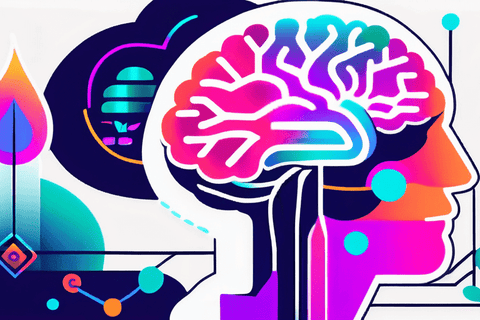Explore the transformative potential of psychedelic-assisted mental health therapy in this insightful article.
Psychedelic-Assisted Mental Health Therapy
Psychedelic-Assisted Mental Health Therapy is a groundbreaking approach that has emerged in recent years, offering hope and new possibilities for individuals struggling with various mental health conditions. Drawing on the therapeutic potential of carefully administered psychedelics, this promising treatment method aims to provide profound healing and transformative experiences. In this article, we will delve into the concept of Psychedelic-Assisted Therapy, explore its benefits, the therapeutic process involved, the risks and controversies surrounding it, and the exciting future of this field.
Understanding Psychedelic-Assisted Therapy
Before we dive into the details of Psychedelic-Assisted Therapy, it's important to gain a comprehensive understanding of this increasingly popular treatment modality. At its core, Psychedelic-Assisted Therapy combines traditional therapeutic techniques with the controlled use of mind-altering substances, such as psilocybin or MDMA, to facilitate profound personal insights, emotional breakthroughs, and lasting positive change.
The Science Behind Psychedelic Therapy
Groundbreaking research has shed light on the neurobiological mechanisms and effects of psychedelic substances on the brain. Psychedelics have been found to stimulate the serotonin receptors in the brain, leading to alterations in perception, mood, and cognition. These chemical processes contribute to the profound psychological effects experienced during psychedelic therapy sessions, which can offer unique opportunities for self-exploration and emotional healing.
During a psychedelic therapy session, the mind is opened up to a heightened state of consciousness, allowing individuals to explore their thoughts, emotions, and memories in a deeply introspective way. This altered state of consciousness can create a sense of expanded awareness, where individuals may gain new perspectives and insights into their own lives and experiences. It is through this process that profound personal growth and healing can occur.
Types of Psychedelics Used in Therapy
Psychedelic-Assisted Therapy encompasses a range of substances, each with its own unique therapeutic properties. Psilocybin, the psychoactive compound found in magic mushrooms, has gained popularity for its ability to induce transformative experiences and facilitate introspection. Another commonly used psychedelic is MDMA, which has shown promise in treating post-traumatic stress disorder (PTSD) by enhancing empathy, boosting self-acceptance, and promoting emotional breakthroughs.
Psilocybin, often referred to as the "sacred mushroom," has been used for centuries in various cultures for spiritual and healing purposes. Its ability to induce altered states of consciousness has been revered by shamans and healers, who believe that it can provide access to higher realms of knowledge and wisdom. In the context of psychedelic therapy, psilocybin is carefully administered in a controlled setting, allowing individuals to explore their inner landscape and confront deep-seated emotional issues.
MDMA, on the other hand, is a synthetic compound that was initially developed as a potential medication for psychiatric disorders. Its unique combination of stimulant and empathogenic effects has made it a valuable tool in the treatment of PTSD. By reducing fear and anxiety while increasing feelings of trust and connection, MDMA-assisted therapy can help individuals process traumatic memories in a safe and supportive environment.
The Role of Psychedelics in Mental Health Treatment
In recent years, the use of psychedelics in mental health treatment has gained significant attention due to its potential to revolutionize how we approach various mental health conditions. Let's explore two specific areas where Psychedelic-Assisted Therapy has demonstrated promising results.

Psychedelic-Assisted Therapy involves the use of psychedelic substances in conjunction with therapy sessions to enhance the therapeutic process. This innovative approach allows individuals to delve deep into their subconscious minds, often uncovering buried traumas or unresolved issues that contribute to their mental health struggles. By creating a safe and supportive environment, therapists can guide patients through intense psychedelic experiences, leading to profound insights and transformative breakthroughs.
Treating Depression with Psychedelics
Depression is a global health crisis, often resistant to traditional treatments. However, emerging studies have shown that psychedelic substances, when administered in a controlled and supportive setting, can lead to profound shifts in mood, alleviating depressive symptoms and offering individuals a renewed sense of hope and purpose.
One of the key mechanisms through which psychedelics may help alleviate depression is by promoting neuroplasticity in the brain. These substances have been found to increase the connectivity between different regions of the brain, allowing for new perspectives and emotional processing. Additionally, the mystical or transcendent experiences induced by psychedelics have been linked to long-term improvements in mood and outlook on life, providing a unique approach to treating this debilitating condition.
Psychedelics and Anxiety Disorders
Anxiety disorders can severely impact an individual's ability to function in their daily lives. Fortunately, Psychedelic-Assisted Therapy has shown great promise in addressing the root causes of anxiety disorders and reducing anxiety symptoms. By facilitating a deep exploration of underlying fears and emotions, psychedelic therapy can lead to lasting healing and a newfound sense of calm and resilience
Research suggests that psychedelics such as psilocybin, the active compound in magic mushrooms, can help individuals break free from the cycle of anxious thoughts and behaviors. By disrupting rigid patterns of thinking and fostering a sense of interconnectedness, these substances offer a novel approach to treating anxiety disorders. Furthermore, the introspective nature of psychedelic experiences allows individuals to confront their fears head-on, leading to a reevaluation of their perspectives and a reduction in overall anxiety levels.
The Therapeutic Process of Psychedelic-Assisted Therapy
Engaging in Psychedelic-Assisted Therapy involves a structured therapeutic process that maximizes the potential benefits while ensuring safety and integration of the psychedelic experience. This therapeutic process can be broken down into three distinct phases: preparation, the therapy session itself, and integration.

Preparing for Psychedelic Therapy
Thorough preparation is a fundamental aspect of maximizing the effectiveness of psychedelic therapy. During this stage, clients work closely with trained therapists to explore their intentions, expectations, and concerns. A therapeutic alliance is built, and individuals are provided with comprehensive information about the substances used, the potential effects, and what to expect during the therapy session.
Additionally, the preparation phase may involve a series of therapeutic exercises and practices designed to enhance the client's readiness for the psychedelic experience. These exercises may include mindfulness meditation, breathwork, and somatic awareness techniques. By engaging in these practices, clients can cultivate a heightened sense of self-awareness and emotional regulation, which can contribute to a more profound and transformative psychedelic journey.
The Psychedelic Therapy Session
The therapy session itself is a carefully crafted and controlled environment, often including supportive music, comfortable surroundings, and the presence of trained therapists to guide and facilitate the journey. Clients are encouraged to explore their inner selves, emotions, memories, and traumas while the psychedelic experience unfolds. Therapists provide emotional support, guidance, and facilitate reflection during this transformative process.
Moreover, the therapy session may incorporate various therapeutic modalities to enhance the therapeutic outcomes. These modalities can include somatic experiencing, cognitive-behavioral therapy, and eye movement desensitization and reprocessing (EMDR). By integrating these evidence-based approaches with the psychedelic experience, therapists can help clients navigate and process deeply rooted emotional wounds, facilitating healing and personal growth.
Integrating the Psychedelic Experience
After the therapy session, the integration phase begins. This is an essential part of the therapeutic process, as it allows individuals to make sense of their experiences, insights, and emotions that arose during the psychedelic journey. Integration may involve regular therapy sessions, journaling, creative expression, and the cultivation of new habits and behaviors that align with the newfound insights gained during the experience.
Furthermore, the integration phase often includes community support and connection. Clients may participate in group therapy sessions or join support groups specifically tailored for individuals who have undergone psychedelic-assisted therapy. These communal spaces provide a sense of belonging and understanding, allowing individuals to share their experiences, receive validation, and continue the process of integration in a supportive environment.
Ultimately, the therapeutic process of psychedelic-assisted therapy goes beyond the mere administration of psychedelics. It encompasses a comprehensive and holistic approach that involves careful preparation, a transformative therapy session, and a dedicated integration phase. Through this process, individuals can embark on a profound journey of self-discovery, healing, and personal growth.
Risks and Controversies Surrounding Psychedelic Therapy
As with any medical or therapeutic intervention, it is crucial to address the risks and controversies surrounding Psychedelic-Assisted Therapy. While extensive research has shown its potential benefits, it is essential to acknowledge the potential side effects and ethical considerations involved.

Psychedelic therapy, although promising, is not without its challenges and complexities. One significant risk is the possibility of triggering latent psychological issues in participants during therapy sessions. These unresolved issues could surface unexpectedly, leading to distressing experiences that require immediate intervention from trained therapists. Additionally, the long-term psychological impact of psychedelic therapy is still not fully understood, emphasizing the need for ongoing research and monitoring to assess its efficacy and safety over time.
Potential Side Effects and Risks
While administered in controlled settings, psychedelics can induce intense and overwhelming experiences that may be challenging for some individuals. It is important to prioritize participant safety, carefully screen for contraindications, and provide comprehensive psychological support to minimize potential risks and ensure a positive therapeutic outcome.
Moreover, the variability in individual responses to psychedelics poses a unique challenge for therapists, as the same dosage and substance can elicit vastly different reactions among participants. This underscores the importance of personalized treatment plans and close monitoring during psychedelic therapy sessions to tailor the experience to each individual's needs and ensure a safe and effective outcome.
Ethical Considerations in Psychedelic Therapy
As this field develops, it is crucial to address ethical considerations and ensure that the therapeutic use of psychedelics maintains a high standard of practice. This includes licensing and credentialing of therapists, informed consent, protection of participant autonomy and confidentiality, and ongoing research to advance the scientific understanding and regulation of psychedelic therapy.
Furthermore, the potential for misuse and exploitation of psychedelic substances for non-therapeutic purposes highlights the importance of establishing clear ethical guidelines and regulatory frameworks to prevent their diversion into recreational or illicit contexts. Striking a balance between promoting access to psychedelic therapy for those in need and safeguarding against potential risks and ethical violations remains a central challenge in the evolving landscape of psychedelic-assisted treatment.
The Future of Psychedelic-Assisted Therapy
The future of Psychedelic-Assisted Therapy holds immense potential, with ongoing research and developments paving the way for wider acceptance and integration within mainstream mental health care.
One area of ongoing research and development in psychedelic-assisted therapy is the exploration of different administration methods. While the current focus is primarily on oral ingestion of psychedelic substances, researchers are also investigating alternative routes such as intravenous administration or nasal sprays. These alternative methods may offer different therapeutic benefits, such as faster onset of effects or more precise dosing, further enhancing the efficacy and safety of psychedelic-assisted therapy.
Ongoing Research and Developments
Research into the therapeutic potential of psychedelics is rapidly expanding, with studies investigating their efficacy in treating various mental health conditions. As scientific understanding grows, we can expect new therapeutic protocols, improved safety measures, and a deeper integration of psychedelic therapy within traditional therapeutic frameworks.
One exciting area of research is the exploration of the long-term effects of psychedelic-assisted therapy. While the immediate benefits of a psychedelic experience can be profound, researchers are interested in understanding how these effects can be sustained over time. Studies are being conducted to examine the potential for psychedelic therapy to induce long-lasting changes in neural pathways and cognitive processes, leading to enduring improvements in mental well-being.
Legal Status and Advocacy for Psychedelic Therapy
Advocacy efforts and groundbreaking clinical trials have led to shifts in the legal status of psychedelic substances in certain jurisdictions. The growing acceptance and recognition of their therapeutic potential have fueled discussions about decriminalization and the need for policy reforms to ensure access to safe and regulated psychedelic therapies for those in need.
Furthermore, advocacy groups are working tirelessly to educate the public and healthcare professionals about the benefits of psychedelic-assisted therapy. They aim to dispel misconceptions and stigmas surrounding these substances, highlighting the rigorous scientific research and the potential positive impact they can have on individuals struggling with mental health conditions.
What conditions are being treated with psychedelic therapy?
Clinical trials are ongoing for psilocybin, MDMA, ayahuasca and others to treat treatment-resistant depression, end-of-life anxiety, PTSD, alcoholism, smoking cessation with promising initial results when monitored by mental health professionals.
How do psychedelics reduce depressive and PTSD symptoms?
Proposed theories are they induce neuroplasticity and emotional breakthroughs allowing psychotherapeutic reprocessing of trauma, restrictive behaviors or thought patterns during session peaks giving lasting mood improvements for months.
What are risks and criticisms around psychedelic mental health treatments?
Critics argue more evidence confirming benefits and safety are needed first considering health risks if adverse reactions occur combined with illegal recreational abuse potential though trials are tightly controlled in medical settings.
How frequently can psychedelic therapy be received and who is eligible?
Given limited data so far, expert protocols only provide limited sessions for diagnoses not improving sufficiently after exhausting standard therapies first. Strict mental health screening criteria apply for eligibility.
If illegal, how are clinical trials administering psychedelics to patients?
Research studies obtaining special federal permissions for schedule I compounds ensure rigorous accountability with physician supervision dosing only in approved medical contexts versus uncontrolled recreational settings with unknown compositions.
Conclusion
In conclusion, Psychedelic-Assisted Mental Health Therapy is a remarkable advancement in the field of mental healthcare. By combining traditional therapeutic techniques with controlled psychedelic experiences, this innovative approach offers individuals a path towards profound healing, self-discovery, and lasting positive change. While risks and ethical considerations exist, ongoing research and advocacy efforts give us hope for a future where psychedelic therapy becomes a standard and accessible option for individuals struggling with mental health conditions.

